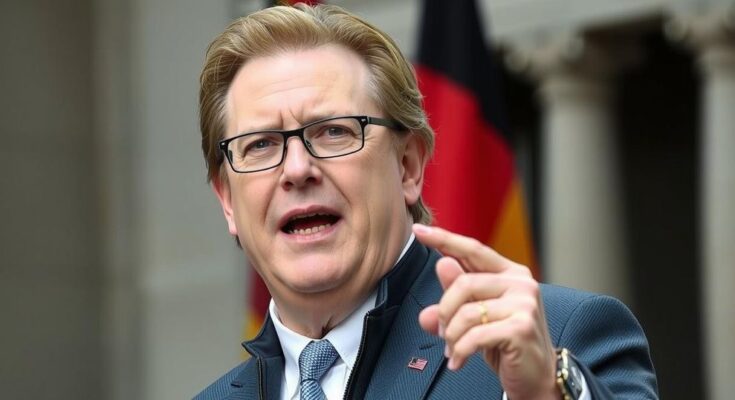Elon Musk’s support for the AfD has incited criticism from German politicians, who view it as intrusive foreign influence. His remarks, featured in the Welt am Sonntag, coincide with impending elections and have drawn denunciations from both government and opposition figures. The issue underscores concerns about external parties impacting German democracy.
Elon Musk, the U.S. billionaire and influential tech entrepreneur, has sparked significant backlash from German politicians concerning his expressed support for the right-wing Alternative for Germany (AfD) party. The criticism follows Musk’s appearance in a commentary published in the Welt am Sonntag newspaper, in which he indicated that “only the AfD can save Germany” while also commending the party’s positions on deregulation and taxation. His comments arrive in a politically sensitive context, as Germany prepares for elections on February 23, following the collapse of Chancellor Olaf Scholz’s coalition government.
This statement has been met with fierce denunciation from both government and opposition leaders. Friedrich Merz, head of the Christian Democrats and a leading candidate for chancellorship, remarked that he could not recall a precedent for such interference in a friendly country’s electoral process. He labeled Musk’s commentary as “intrusive and pretentious.” Similarly, Saskia Esken, co-leader of the Social Democrats, asserted her party’s commitment to defend democracy against manipulation by wealthy individuals and external actors. Musk’s role as an adviser to U.S. President-elect Donald Trump adds another layer of complexity, raising concerns over foreign influence on German sovereignty.
The editor-in-chief designate of the Welt defended the publication of Musk’s commentary, emphasizing that democracy thrives on diverse opinions, even those that provoke debate. The AfD’s rising position in opinion polls—a potential hindrance to mainstream parties—spotlights the contentious political landscape in Germany, where traditional parties have vowed to avoid collaboration with the AfD on a national level. This situation illustrates the delicate balance between freedom of expression and the responsibility inherent in political discourse.
The political landscape in Germany is becoming increasingly intricate, particularly with elections approaching after the collapse of Chancellor Olaf Scholz’s government. The Alternative for Germany (AfD), known for its right-wing populist stance, has been gaining traction, and the implications of celebrity endorsements or support can significantly shape public opinion and voter behavior. The criticism aimed at Elon Musk underscores the trepidation surrounding foreign influence in national elections, a matter that resonates beyond Germany and touches upon broader themes of democracy and the integrity of electoral processes.
In conclusion, Elon Musk’s endorsement of the AfD has provoked a considerable political uproar in Germany. Politicians from various parties expressed concerns over foreign interference in domestic affairs, asserting that democracy should remain unfettered by external influences. The incident highlights the ongoing tension between free expression and the need to safeguard democratic integrity, particularly as Germany approaches a pivotal election.
Original Source: www.investing.com




